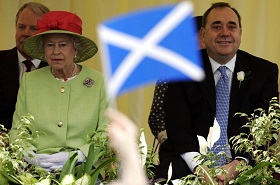Now that the dust is settling on the referendum on Scottish Independence held on September 18, 2014 we are better able to see it in perspective. That 45 per cent of voters in Scotland voted ‘yes’, and on a ballot where 85 per cent of people voted, is a remarkable achievement, even though a clear majority, 55 per cent, voted ‘no’. One year ago, in 2013, the pro-independence vote stood at just over one-third.
Now that the dust is settling on the referendum on Scottish Independence held on September 18, 2014 we are better able to see it in perspective. That 45 per cent of voters in Scotland voted ‘yes’, and on a ballot where 85 per cent of people voted, is a remarkable achievement, even though a clear majority, 55 per cent, voted ‘no’. One year ago, in 2013, the pro-independence vote stood at just over one-third.
How, then, do we explain the outcome, and what are its wider implications? First of all, it is important to see this in a historical context. Scotland was an independent state for over 700 years until it entered a union with England in 1707. It retained many of its autonomous institutions: its legal system, religion, education, and remained a distinctive civil society. The Union with England was a ‘mariage de raison’, and not the result of conquest, oppression or incorporation. Being a Scot was defined as someone living in the territory of Scotland. It was not an ‘ethnic’ or racial characteristic.
By the end of the 20th century, it was clear that the ‘marriage of convenience’ was in need of major revision because Scotland was increasingly governed from Westminster by a government it had not elected. This was the result of England having a population ten times larger than Scotland’s. In 1999, a devolved parliament was established in Scotland with control over domestic affairs, including law and order, education, health. It became increasingly clear over the following decade that Scots wanted more powers for their parliament. In 2007 and again in 2011, the Scottish National Party (SNP), in western European terms, a centre-left party, was elected as the devolved government. It negotiated the terms of a referendum with the UK government in London, which had formal responsibility for constitutional matters, such that voters were offered a simple question: ‘Should Scotland be an independent country?’, to which they had to choose a simple yes or no.
The problem was that public opinion in Scotland is not simply split between pro- and anti-independence. In the surveys carried out over previous years, about one-third supported independence, 30 per cent a more powerful parliament (‘devolution-max’) which controlled taxation and welfare, while remaining within the UK, one-quarter the status quo, and under 10 per cent who preferred full incorporation into Westminster government. In the event, the decision was most difficult for supporters of ‘devolution-max’, whose preference was not easily covered by a simple yes/no, and was not on the ballot paper.
The campaign lasted almost two years. The ‘yes’ campaign was more vibrant, positive, and based on grassroots, with support from the SNP and The Scottish Green Party. The ‘no’ campaign was backed by the self-styled ‘unionist’ parties, Labour, Conservatives and Liberal-Democrat, the latter two parties in coalition government at Westminster. Described as ‘Project Fear’, the ‘no’ campaign under the slogan ‘Better Together’ pointed out the economic and political risks of Scotland leaving the Union. At the beginning of September, one opinion poll predicted a narrow ‘yes’ victory, and this intensified efforts by the ‘no’ campaign, and the UK government to oppose independence. In the final event, the ‘no’ campaign won by a greater margin than most polls predicted, and there is evidence that a pledge, made late in the day, by the unionist parties to devolve more powers to Scotland if there was a ‘no’ vote had the desired effect.
The Scottish independence campaign has raised wider issues about government in the UK: how the UK parliament handles ‘English-only’ matters, demands from northern England for devolved powers, and opposition to centralising economic and political power in London.
Nor is Scotland unique. There are many territories in western Europe which consider themselves nations: Catalonia, which intends to carry out a referendum in November against the wishes of the central government in Madrid; similarly the Basques in northern Spain who have a strong sense of national identity; the Flemings in Belgium. What drives demands for greater political autonomy, and even independence, is the desire for greater democracy, control over decision-making, and not regressive ‘ethnic’ issues. In all cases, these are peaceful social and political movements which are not pursuing regressive policies, racism, still less hostility to ‘foreigners’. There are, of course, right-wing political parties which do pursue such policies, but by and large these are hostile to what they see as political ‘secession’. The demands for greater autonomy and independence are, on the contrary, pursued by centre-left movements concerned with achieving greater self-determination and social justice in their nations.
What we are seeing in the modern world is a crisis of the so-called ‘nation-state’, in which territories with a strong sense of national identity (‘nations’) demand greater self-determination from existing states, even to the point of demanding states of their own. Similarly, there is recognition that we live in an inter-dependent world, and that the demand is for self-government and not ‘autarky’, or ‘fortress states’. The example of Scotland, one of Europe’s oldest nations dating back at least to the first millennium, reflects the demand for inter-dependence in the modern world of the 21st century.





